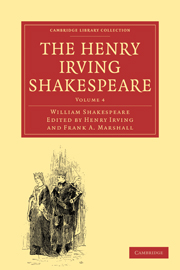5 - TWELFTH NIGHT; OR, WHAT YOU WILL
Published online by Cambridge University Press: 05 October 2010
Summary
INTRODUCTION
LITERARY HISTORY
Twelfth Night was first printed in the Folio of 1623, where it occupies pp. 255–275 of the Comedies. Its date is fixed, within certain limits, by a reference discovered by Mr. Hunter in 1828. It is found in a MS. volume in the British Museum (MSS. Harl. 5353) containing the diary of John Manningham, a member of the Middle Temple, from January 1601–2 to April 1603. The entry for February 2, 1601–2, is as follows :—
“At our feast wee had a play called Twelue night or what you will, much like the commedy of errores or Menechmi in Plautus, but most like and neere to that in Italian called Inganni a good practice in it to make the steward beleeue his Lady widdowe was in Loue with him by counterfayting a letter, as from his Lady, in generall termes, telling him what she liked best in him, & prescribing his gesture in smiling his apparaile &c. And then when he came to practise making him beleeue they tooke him to be mad.”
This entry proves that Shakespeare's play must have been written before February 1601–2; its absence from the list in Meres’ Palladis Tamia shows that it could not have been known before September 1598. The introduction in the play of some fragments from the song, “Farewell, dear heart, since I must needs be gone,” further narrows the limits of conjecture; for this song first appeared in 1601 in the Booke of Ayres composed by Robert Jones.
- Type
- Chapter
- Information
- The Henry Irving Shakespeare , pp. 349 - 422Publisher: Cambridge University PressPrint publication year: 2009

